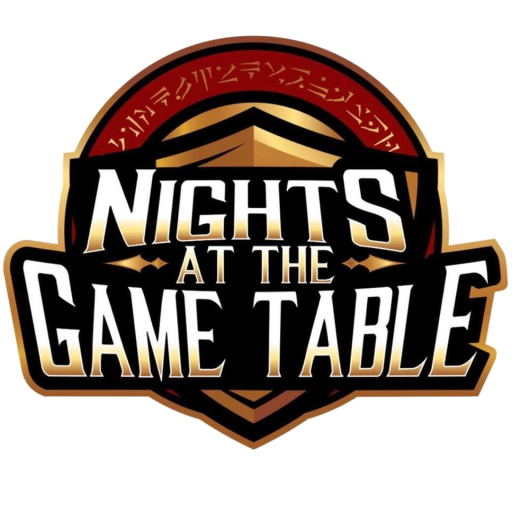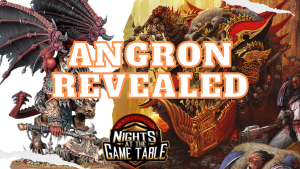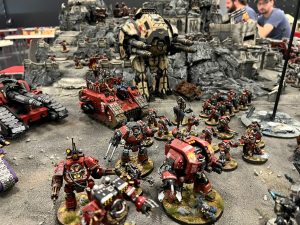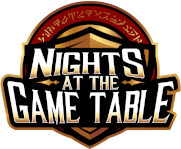Hooray! You’re off to a 40K tournament. Maybe it’s your first or maybe it’s your 50th. Maybe you’ve yet to win a competitive game or maybe you’ve got so many trophies your name is spoken of in hushed whispers when gamers gather at local stores.
Ask yourself. What type of player do you want to be?
Do I want to win at all costs? This is not an article about that. I can’t help you there. There’s currently a pervading thought that the top players at 40K tournaments are mostly out to win by any means they can, and that the winner of a big GT is usually the guy who screws over his opponents the most. Understandably, this kind of image is one that dissuades people from coming to events. Whilst the majority of people who go to events are there to have a great time, meet up with friends and push little models around it is true that in recent years there has always been some kind of drama surrounding the players at the top tables.
That’s not a good image for our hobby and with a view to showing people that it doesn’t have to be that way Nick asked me to put together the following article.

This is an article about playing well and being a decent human being (a Gentleman, or Gentlelady I suppose) while doing so. Not about how to win. The two are not mutually exclusive and it is certainly possible to do both at the same time. At the risk of self-aggrandizing I should know – I’ve done it.
So why should anyone care how I play?
Good question.
1. Playing decently usually equates to less stress. Tournaments are usually stressful enough with time constraints, the pressure to do well, making time to eat and drink so that anything which makes for a stress free game has got to be good.
2. Do you care about your character/reputation? Ours is a small community and it doesn’t take long for word to get out that ‘Player A’ is bad to play against. You don’t want that reputation (If I have to point out why then you’re probably not reading the article).
3. If you’re playing in a decent way your opponent will generally return the favour. So you might give them a mulligan at some point during the game and they may well give you one in return. I’ve lost count of the number of times I’ve offered to let my opponent go back and shoot with a model that they meant to or to take the feel no pain saves that they forgot. Or they may just tell their friends what an awesome and cool person you were which is fine as well (see point 2, above). And if you give them a take-back and they don’t let you have one later, well you’ve got the moral high ground and that’s something.
4. Basically what goes around comes around (back to the reputation thing). If you are known to be a good player who happens to be a decent human being at the table people will enjoy playing you and you’ll have your stress-free game. You’ll help make their tournament experience just a little bit better and if was their first tournament you’ve given them a reason to come back.

Your mindset
You’re about to spend 2 ½ – 3 hours just a few feet away from someone who might be a complete stranger. This is time you’ll never get back so have a quick think about how you approach the game.
Option 1 – this person is a roadblock on my way to winning the tournament and I need to win to ensure my path to 40K glory marches on unimpeded. My first priority here is winning the game and I’m not too concerned about whether my opponent has a good time or not. Okay, nothing wrong with this (except for maybe you’re taking this game a little too seriously) but this really isn’t the article for you.
Option 2 – I’d sure like to win this game and I’ll do my best to try and make that happen but I’m not going to go out of my way to make things miserable for my opponent because that is neither big nor clever. In fact given that I’m about to spend a few hours of
my life playing a game with them I’m going to try and have a good time and hopefully they have one as well.
Assuming you’re still reading, here are some easy things you can do to make the game go well.

Give your opponent no cause to doubt that they’re getting a fair game (if they think you’re screwing them over somehow then it doesn’t matter how personable you are or how many times you offer to get them a glass of water it’s going to be a bad game and if the tournament has a sportsmanship score you’ve just blown it).
Know your rules and have any rulebook and associated FAQ to hand so you can show your opponent what’s going on should they ask. Remember your opponents at a tournament may not know your army as well as you so be prepared to show the rules that you are using.
Keep a consistent cocked dice roll policy. Personally if it’s not flat on the gaming surface I reroll the result. Some people try and balance another die on top of the slightly cocked one which is also cool. Whatever you pick keep it consistent.
Roll all your dice in the open and slowly enough that your opponent can keep up with what’s going on. Your opponent may not care that he can’t see all your rolls all the time but it’s a great habit to get into. Similarly, take your time separating hits from misses from the pile of dice you’ve just rolled. Typically most tournament games can feel rushed but take it easy – trying to speed your way through this can leave a bad taste in someone’s mouth if they think you’re picking up too many hits, even if you’re not.

Don’t slow play. Make every effort to move the game along at a reasonable pace (but see
the comment about rolling dice, so you have to strike a balance) so that you and your opponent both get enough turns in the game to feel that you’ve actually both played and you’re not ending the game by turn 2 or 3 when things are just getting interesting.
Sometimes getting a lot of turns in just isn’t possible if you and your opponent both have high model count armies or both armies are active in every phase of the game. In this case just do your best and there are things you can do to help your opponent – separating
hits from misses with dice rolls is one.
Playing the game
Playing nice doesn’t mean that you have to let the other person win. It doesn’t even mean you have to take your foot off the gas (though you may want to think about that if your opponent has literally no chance of winning and you can achieve victory without crushing their hopes and dreams. I mean seriously, that doesn’t impress anyone).
It also doesn’t mean that you have to give your opponent take-backs or that you don’t capitalize on a mistake that they may have made though you probably shouldn’t laugh at the mistake and make them feel bad (unless they’re a good friend of yours and they’ve got it coming for all the times they’ve beaten you in the past). It’s okay to point it out after the game as something they might learn from if they play an army like yours again.
Neither does it mean you can’t question rules that your opponent is taking advantage of. There is nothing wrong with asking your opponent to show you in the rules how they are
doing something or if they mind just explaining the thing that just happened. It’s also perfectly fine to get a judge to come and give a ruling on something when you and your opponent cannot agree on how a rule should be played. Tournaments have judges for just this eventuality but once they’ve given their ruling that’s the end of the discussion. If in your mind they’ve categorically made the wrong call then that’s where the tournament organizer comes in and they make the final decision.

Decide on whether you are comfortable playing the game by ‘intent’ or would you prefer exact measurements. An example here would be that they tell you their intention is to move a particular unit so as to mean you’ll need a 10” charge to get to them in close combat. Personally I’m fine with this as I feel it speeds the game up but it’s also perfectly okay to play by exact measurements. Pick one way to play and stick with it.
Helping your opponent
This is by no means necessary and you can have a great game that’s fun and friendly without helping the other person once.
However for reasons given a little later I typically try and help during the game if I think my opponent would benefit from making another decision. Keep in mind it’s always worth asking in advance if they’re okay with you giving them advice. In my experience
just about everyone will say yes but you never know.
This could be as significant as deployment – for instance your opponent’s deployment means they’re not going to have much of a chance at winning the game. I was playing at a big GT last year and my opponent didn’t deploy very well out of concern for what my army could do – after checking it was okay to give advice I pointed out they’d handed me the win (and explained how the game would unfold) and asked them if they’d like to reset things. They did and we ended up with a great back-and-forth game that I only barely won. A much better game than if I’d have won without really rolling dice.
It could also be something minor though like forgetting to fire all models in a unit, or they move on to the psychic phase having forgotten to move a unit.

So why should I help my opponent?
You don’t have to. You can have a perfectly good game of 40K without correcting mistakes along the way and at the end of the game you can shake hands on a well fought out battle.
You can help make your opponent a better player. We tend to learn how to be better when we make mistakes and by pointing out mistakes as they happen during the game you can help your opponent improve right there and then.
If you win the game you’ll feel better that you helped your opponent and still managed to pull out a victory. You’ll know that you won because you either outplayed your opponent or were just plain luckier, rather than winning because they forgot to move a model or
that they should have been rolling additional saves for a unit.
Our hobby is ultimately a pretty small community and ultimately the more people that play the game the better. By helping someone out they’ll hopefully take that knowledge back to their local store or club and pass it on to others.

In conclusion – have a good time
At its very core 40K is a game. Lives are not on the line and neither are vast amounts of money (okay so sure we’ve all spent untold wads of money on this hobby but even the most lucrative prize in the game won’t even put a dent in that expense). Some of us can
get a little carried away though and lose perspective of that. Ultimately don’t you want to have a good time when you play?
To that end I always try and make sure I’m having fun. With any luck my opponent will pick up on it and have fun as well but at the very least then I’ve had a good time. People often ask me why most of my armies are painted pink with flowers and the answer is
really very simple. It makes me smile.
With any luck this article will encourage people that it’s perfectly possible to do well at a tournament and still have a good game with every opponent. If you’re reading this and you see me at the next event hopefully we’ll get to play – I’m looking forward to a good
game.
Alex Fennel

Warhammer 40k Winning Lists June 11th Edition
With summer in full swing, we see a refreshing number of tournaments kick back up globally, ranging from 3 to 7 rounds



